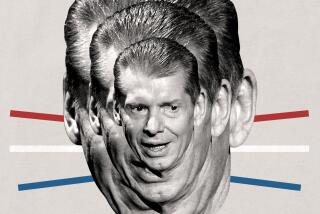Malone’s New Role at AT&T; Not Yet Known
After more than three decades, cable mogul John Custer Malone is returning home to AT&T; about $2 billion richer than when he toiled there as an economic planner and in research and development fresh out of college.
Exactly how extensive a role the restless, impatient executive would play at AT&T; as a director now that the phone giant has agreed to acquire Malone’s Tele-Communications Inc. in a $46.5-billion deal is something virtually no one who knows the enigmatic executive can agree upon.
Would Malone, 57, go back into the near semi-retirement he was in just three years ago, boating off Maine, where he and his wife drive from Colorado in a motor home each year to spend their summers?
Said one executive who knows him: “He’s a genius. This is his grand exit strategy from the business.”
But the other, diametrically opposed school of thought is that Malone would relish using the leverage and clout of AT&T; to try to bring about the telecommunications vision he has long preached for the cable industry in which television viewers would have scores of channels and interactive services at their fingertips.
“I think John will be much more active on the AT&T; board than people think. He’s not going to ride off into the sunset and go off on his boat in Maine,” said Marc Nathanson, chief executive of Los Angeles-based Falcon Communications, a cable partner with TCI.
At a news conference Wednesday in which the acquisition was formally unveiled, TCI Chairman Malone called the deal “an interesting round trip for me.” He noted that when he left AT&T; and its Bell Labs unit in 1966, he did so “with an education substantially paid for by AT&T.; Now they’re getting their dividend.”
Malone studied electrical engineering and economics as an undergraduate at Yale, adding a master’s degree in industrial management and a doctorate in operations research, both from Johns Hopkins. After leaving AT&T;, he worked as a consultant for McKinsey & Co. before joining TCI in 1973 to work for its founder and his mentor, the late Robert Magness.
For Malone, it has been a lucrative round trip. By his own count, Malone has about $1.8 billion of his net worth tied up “in how well these guys do.” That includes an additional $240 million of TCI shares he announced he would buy as part of the deal.
That, plus other investments, could put Malone’s net worth today at about $2 billion. Last fall Forbes estimated Malone’s worth at $750 million, but revised the number on Wednesday to $1.8 billion to reflect TCI’s higher stock price.
Malone’s brusque, often arrogant and detached manner has alienated the press, investors, regulators and politicians over the years.
The most famous quote about him came courtesy of Vice President Al Gore, then a senator, who said Malone was cable’s “Darth Vader.” Malone also was criticized for statements in the early 1990s that many believe promised too much too soon in cable. His mantra about a 500-channel universe of interactive channels became something of an albatross for the industry. Critics cited it as an example of the exceptional hype that once surrounded the convergence of television, telecommunications and entertainment.
Malone also has been criticized for structuring numerous complicated deals that inevitably enrich him. Last January, he took extensive heat in his hometown of Denver when he ended up making $150 million in a side agreement of a settlement of the bitter court battle over the Magness estate.
Executive pay expert Graef Crystal said that figuring out the exact nature of Malone’s holdings is akin to undertaking “an archeological dig,” because of the layers of trusts, stock classes and interlocking companies in Malone’s empire.
“It would be enough for at least three financial doctoral students at UCLA to do their dissertations on,” Crystal said.
In January, Malone told the Rocky Mountain News that he plans to give most of his fortune to a family foundation to benefit education. “You know, after the zeros and numbers get so big, you just can’t really comprehend. What are you going to do with it? How many cars . . . and vacation homes can you own?” he told the paper.
Some believe that Malone would spend much of his efforts with Liberty Media Group, which is closely allied with such moguls as Barry Diller and Rupert Murdoch and has stakes in such operations as QVC Inc., USA Networks, Discovery Channel, Encore Media and Liberty Fox Sports. Malone has a 4% stake in Liberty, but controls the company through ownership of a special class of stock.
Former AT&T; multimedia executive Robert Kavner, who now heads a company delivering pay-per-view services to hotels, said that Malone’s well-known dislike for regulators--Malone reportedly joked openly that a federal regulator should be shot--make it unlikely that he would get heavily involved in a lot of AT&T; issues.
“He does not seem to have the patience to deal with the regulatory processes that AT&T; is still having to deal with,” Kavner said.
That said, Kavner added, Malone has a lot to offer AT&T; as a board member.
“Purely as a director, John is a very intelligent fellow. He can see three to four steps down the chess board crisply. That is very valuable as a director at a complicated company like AT&T.;”
More to Read
Inside the business of entertainment
The Wide Shot brings you news, analysis and insights on everything from streaming wars to production — and what it all means for the future.
You may occasionally receive promotional content from the Los Angeles Times.










